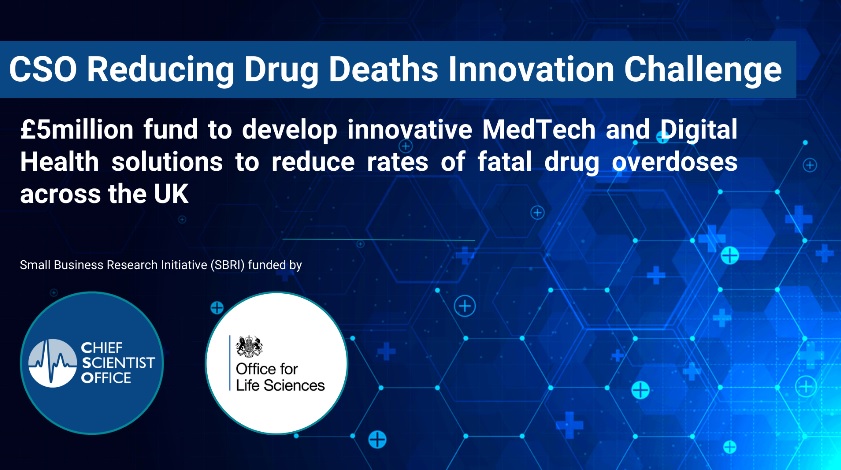CSO Announce Successful Completion of Phase 1 of the Reducing Drug Deaths Innovation Challenge

Chief Scientist Office Announce Successful Completion of Phase 1 of the Reducing Drug Deaths Innovation Challenge
The Reducing Drug Deaths Innovation Challenge Phase 1, jointly funded by the Scottish Government Chief Scientist Office and UK Government Office of Life Sciences has been successfully completed. The Challenge has been managed and administered by NHS Fife, on behalf of Health Innovation South East Scotland (HISES) Innovation Hub.
11 innovative projects were funded to collaborate with Test Bed Research Partners across the devolved nations to develop technology solutions aimed at reducing drug deaths, bringing together a diverse range of partnerships including leading universities, healthcare providers, charities and industry specialists in England, Scotland, Wales and Northern Ireland.
Through extensive collaboration, these projects conducted a significant number of workshops with experts, frontline healthcare personnel, and individuals with lived experiences. This cross-sector and on-the-ground engagement allowed them to develop innovative products ranging from wearable devices to AI-powered applications that are tailored to real needs. The 11 Phase 1 projects focused on innovations such as:
- Wearable biosensors to identify physiological signs of overdose
- Devices and apps to monitor mental health and deliver support
- Sensors tailored to drug users in hostels to detect overdose episodes
- Digital platforms to direct those at risk to emergency services
- Formulations and delivery mechanisms for life-saving naloxone
Charities and healthcare systems, as well as those with lived and living experience, across the devolved nations provided crucial insights into the on-the-ground challenges and opportunities to reduce drug related harm. Their involvement was critical to developing solutions designed for real-world impact.
The successful completion of Phase 1 represents important progress in leveraging cross-nation and cross-sector collaboration and innovation to address the urgent public health impact of drug use and addiction across the United Kingdom.
This challenge tapped into expertise across the UK to create solutions tailored to local contexts. The teams and technologies show promise in helping tackle the tragic loss of lives from drug use in communities throughout the country.
The Phase 1 participants will be invited to apply for the next phase of funding, where they can further validate and implement their solutions across the devolved nations. Phase 2 will allow for the development, testing and validation of a solution or prototype for up to 12 months.
Phase 1 participants
The 11 successful Phase 1 projects and their key goals are summarised below:
- University of Glasgow – ASSESSOR Project: Development of a low-cost skin-interfacing sensor for long-term and remote monitoring of mechanical and physiological signs of overdose.
- eMoodie – Saving SAM Project: AI-enabled system for monitoring potential drug overdoses, enabling self and responder digital alerts.
- Manchester Metropolitan University – DoseCare Project: Development of AI-powered, wearable-integrated system for overdose detection and response, aiming to improve patient outcomes and enhance care delivery using wearable technologies.
- NOMW Health – LifeSavr Project: Assessment of technical, economic, and operational aspects of a wearable device that uses advanced sensor technology for real-time detection of opioid overdoses.
- ZioHealth – Development of a handheld therapeutic drug monitoring device for self-monitoring Benzodiazepine use, aiming to improve harm reduction strategies for illicit drug use.
- Midlands Partnership NHS Foundation Trust – Development of a wearable technology that detects absence in user movements, alerting the individual or surrounding people to the need for intervention.
- SCIENAP – CHAI999 Project: Exploration of digital tools that empower friends and family to support drug users, respond to overdoses, and coordinate with emergency services.
- Vivisco –Smart Revive Beacon for Opiate Overdose: Co-designing and prototyping an automatic alert system that triggers when a naloxone package is opened, sending emergency services the GPS location and type of antidote used.
- King’s College London – Testing feasibility of ultra-portable, fast-dispersal naloxone tablet for constant carriage, aiming to increase availability of this overdose antidote during emergencies.
- DroneMatLab – In Time Naloxone Project: Development of an emergency response system for distributing naloxone by drone, aiming to prevent opioid overdoses from becoming fatal.
- Mesox – RescuePatch Project: Investigation of a novel transdermal patch combination therapy containing antidotes to both opioid and benzodiazepine overdoses, designed for application by non-professionals.

